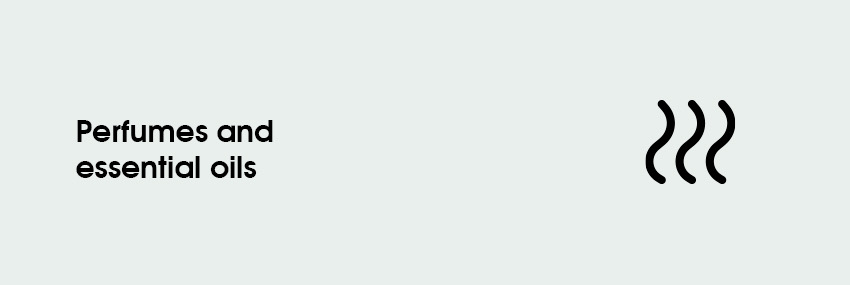Do you like perfumes in cosmetics? Did you hear somewhere that a certain essential oil is the key to solve your skin concerns? I understand that scents are something really personal (and can add a special touch to skincare products), but maybe you should avoid those perfumes and essential oils, I’ll show you why!
Hello! In this article I want to tell you about some ingredients that we frequently find in our cosmetics and whose existence is controversial, at least: fragrance and essential oils. If you read me often you will know that they are not among my favorites, but in this post I will explain in detail the reasons.
Specifically, in this post I will talk about the following topics:
- What are perfumes and essential oils?
- Why are there perfumes and essential oils in our cosmetics?
- Why don’t your cosmetics need perfumes or essential oils?
1. WHAT ARE PERFUMES AND ESSENTIAL OILS?
Perfumes and essential oils are some of the most common ingredients in cosmetics.
When we talk about perfume we are referring to a combination of oils (of natural or artificial origin, this differentiation is irrelevant) of a volatile nature and that provide a specific fragrance to a product. Its main function is to improve the sensoriality of the product, giving it a characteristic scent. In the ingredient lists you may find it as Fragrance, Perfume or Parfum, and the maximum amount of perfumes that can be incorporated into a product is 1% of the formula.
On the other hand, essential oils are additives derived from plants that are also used in cosmetics to add a certain fragrance to products. To make these essential oils, various volatile substances are combined (sometimes incorporating up to 100 different substances), by distillation or cold pressure, to create a final compound that is that essential oil that brings a specific scent to the product. There are countless essential oils such as Balm Mint Oil, Bergamot Oil, Camphor Oil, Clary Sage Oil, Eucalyptus Oil, Geranium Oil, Geraniol, Ginger Oil, Grapefruit Oil, Jasmine Oil, Lavender Oil, Lemon Oil, Lemongrass Oil, Limonene, Linalool, Lime Oil, Mandarin Oil, Neroli Oil, Oregano Oil, Patchouli Oil, Pennyroyal Oil, Peppermint Oil, Rose Oil, Rosemary Oil, Sage Oil, Sandalwood Oil, Tangerine Oil, Wintergreen Oil, Ylang Ylang Oil. As you can see, you can identify these essential oils because they are commonly called X Essential Oil (X corresponding to the name of some sort of plant). There are currently various organizations (such as ISO, AFNOR, IFRA, BfR or RIFM) that set the standards for how essential oils should be developed and used.
It is important to understand the difference between essential oils and vegetable oils. The latter are extracted from the fatty parts of plants (fruits and seeds) and provide us with their antioxidant, moisturizing, and anti-inflammatory, properties, among others (unlike essential oils, which do not provide these benefits to our skin). Therefore, while essential oils simply add a scent, vegetable oils nourish our skin.
2. WHY ARE THERE PERFUMES AND ESSENTIAL OILS IN OUR COSMETICS?
As I mentioned earlier, the main reason we find perfumes and essential oils in our cosmetics is because they give them a specific fragrance. This makes the experience of using them more special, associating an aroma with a specific product and its use. It may seem like a no-brainer, but an aspect as simple as the smell of a product can truly make it different from the competition.
In the case of essential oils it is common to see manufacturers that show them as a natural solution to our skin problems (in fact, its own name, essential oil, can be misleading for consumers, who we may think are necessary or fundamental to take better care of our skin).
Some brands try to go a step further, arguing that the use of their perfumes is endorsed by aromatherapy, which has been used for centuries. However, the fact that it is such an ancient practice does not mean that its effectiveness is proven (in fact, there are hardly any studies that defend its effectiveness), so in this case we are dealing with pure marketing to better market the product. In my opinion, there is a difference between creating an environment with a specific odor and applying it to the skin.
In the case of perfumes, in addition, it should be mentioned that manufacturers do not have the obligation to disclose the substances that make up that specific fragrance, since it is considered a trade secret. This way, perfumes can be created from various raw materials, without consumers being aware of the compounds that make them up.
3. WHY DO YOUR COSMETICS NEED NO PERFUMES OR ESSENTIAL OILS?
Those of you who know me better will know that I usually prefer to avoid cosmetics that include perfume and essential oils among their ingredients. As I mentioned before, its only function is to improve the experience of use, but for me it is not relevant that a product has a specific scent to enjoy it.
Both perfumes and essential oils are potentially irritating substances, in fact, it is recommended to avoid them for those who have sensitive skin. In addition, in the case of essential oils, they are very unstable substances, so any small change can make them even more irritating than usual. This irritation has an important long-term effect, which is that it favors skin aging.
Although there are studies that argue that a specific amount of essential oils (up to 0.1%) is not irritating, it must be borne in mind that many products incorporate more than one essential oil among their ingredients, which increases their potential irritation.
The fact that they are irritating or unstable ingredients does not mean that their use is not safe. All the ingredients used to make the cosmetics we purchase are safe, since they must pass very exhaustive and rigorous tests to verify that they are not harmful to our body.
In any case, as you will understand, if I can avoid ingredients that, although safe, are potentially irritating, I will always try to do so. We are so used to finding perfumes and essential oils among the ingredients of our cosmetics that we already have them assimilated as one more part of them. After all, manufacturers take advantage of one of our most basic senses, such as smell, showing us a pleasant aroma, associating that scent (and that positive feeling) with the product. Admittedly, at first glance (or at first smell, I couldn’t help but say it), products that lack perfumes and essential oils may seem too simple, neutral, or even unappealing, but if you think about your priority when using those cosmetics (which is taking better care of your skin), you will begin to appreciate products that do not smell like roses, citrus, menthol, etc. I, of course, prefer the long-term benefit of avoiding perfumes and essential oils than that positive feeling that lasts no more than a few seconds.
Does this mean that I will stop buying products with perfumes and essential oils? As far as possible, and whenever there are alternatives, yes. But if I like a product a lot and it gives me more benefits than the negative part of perfumes and essential oils, I will prioritize the first.
Do you usually notice if the cosmetics you use include perfumes or essential oils? Do you also try to avoid them? Tell me in the comment section!
If you liked this post and want to continue learning to take better care of your skin, I recommend reading these other articles:
Do you want to learn to take better care of your skin? You can see an index of all my informative posts here.● Follow me on Instagram, Facebook, TikTok and Pinterest.
● Share, comment and like my posts on social media.
● Shop through my links to help me keep up with this blog.

I’m Nacho and I’m passionate about skincare. I really enjoy learning and sharing my knowledge about skincare and I read scientific papers so you don’t have to. I want to break stereotypes because I believe skincare has no gender: skin is skin.



Very well-written article. Thank you for putting this out into the world. More people need to know this! Brands like overhyped AND overpriced brands like “professional-grade” Dermalogica, Rationale, and AESOP should know better yet they, among many others in the industry, continue to mar otherwise perfectly well-formulated products by including pervasive amounts of so-called “essential oils”…
Hi Gabriel!
Thanks a lot for sharing your thoughts on the topic. I agree that essential oils (whose name is quite tricky, since it leads us to believe that they’re important in some sort of way) are more common than I’d like in cosmetics.
I understand that a skincare routine is also a sensorial experience and many people find an extra reason to use their skincare in the scents that come with them, so finding a right balance here must be quite difficult for manufacturers.
Here you can take a look at this index of all my informative posts, I’m sure you will find more useful posts! 😉
Remember to follow me on Instagram, Facebook, Pinterest and TikTok and to like, comment and share my posts so that I can help more people take care of their skin 🖤
Have a great day,
Nacho.